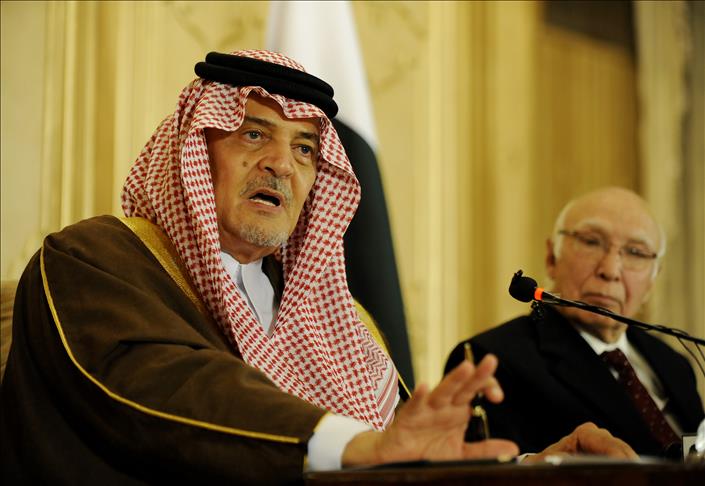S. Arabia, US agree on Iran, Yemen, Syria
Saudi Arabia on Thursday expressed concern that Iran may eventually develop the ability to manufacture nuclear weapons.

CAIRO
Saudi Arabia on Thursday expressed concern that Iran may eventually develop the ability to manufacture nuclear weapons.
The oil-rich kingdom said it was not opposed to the Islamic Republic having a peaceful nuclear program.
"The nuclear talks should guarantee Iran's right to have a peaceful nuclear program," Saudi Foreign Minister Saud al-Faisal said.
He added, however, at a joint press briefing with U.S. counterpart John Kerry in Riyadh, that the ongoing talks should prevent Iran's nuclear program from being used to make weapons.
Iran has been locked in intensive talks with world powers over its nuclear program, which it insists is intended for peaceful purposes.
But the talks have yet to produce a breakthrough, as the Islamic Republic continues to stress its right to enrich uranium and have its own nuclear program.
The program has caused particular concern in the Arab Gulf, where Sunni-majority states shudder in fear at the prospect of Shiite Iran having access to nuclear weapons.
The Iranian nuclear program has also caused concern in Israel, where decision-makers say that a nuclear bomb would enable Iran to threaten the self-proclaimed Jewish state with destruction.
Kerry, meanwhile, said results of the nuclear talks with Iran would have serious ramifications on both U.S.-Iran relations Iran-Gulf relations.
He said the U.S. would ensure that Iran would not develop a nuclear-weapons capacity, noting that talks between Iran and world powers were making headway.
Nevertheless, the U.S. secretary of state added that he was not sure whether or not a deal could be reached.
Any agreement, he said, would depend on whether Iran was ready to offer concessions in terms of its nuclear program.
Kerry said that, as the international community negotiates with Iran, it would not ignore Iranian activity elsewhere, especially in Syria and Yemen.
Iran is reported to be heavily involved in the Syria conflict, where it is helping the army of Syrian President Bashar al-Assad fight a heavily-armed opposition.
The Islamic republic is also accused of abetting a Shiite uprising in Yemen, which is also causing concern in the Gulf.
Houthi coup
Saud al-Faisal has described the latest measures taken by Yemen's Shiite Houthi group as a "coup."
He said members of the Gulf Cooperation Council and the international community had rejected the coup against Yemeni President Abd Rabbuh Mansour Hadi.
"Everybody rejects the ramifications of this coup," al-Faisal said.
Last September, the Houthis occupied Yemeni capital Sanaa before moving on to establish control over other provinces.
Some four months later, they put Hadi under house arrest before issuing a "constitutional declaration" dissolving Yemen's parliament and creating a national assembly.
The moves sent shockwaves across the Gulf, where Sunni-majority states fear the rise of a new Shiite power in their backyard.
Al-Faisal said his country supported the resumption of the political process in Yemen based on a 2011 GCC initiative for resolving the crisis and recommendations issued at a 2014 dialogue between Yemen's political forces.
Kerry, meanwhile, said his country hoped that Yemenis could reach a consensus on the basis of the GCC initiative.
Unending Syria war
In terms of Syria, Kerry said the world wanted to see an end to that country's ongoing conflict, which is about to enter its fifth year.
Almost 75 percent of the Syrian people, he said, had been displaced – and the country almost completely destroyed – simply because its president refused to step down.
Kerry asserted that Syria's President al-Assad had lost "all legitimacy" when he decided to kill his own people.
The fight against the Daesh militant group, Kerry added, was necessary so that Syrians might rebuild their war-ravaged country.
"Daesh" is the Arabic acronym for the so-called "Islamic State of Iraq and Levant" (ISIL) group, which overran vast territories in both Iraq and Syria last year.
Saudi Arabia's al-Faisal said he agreed with Kerry on the need to step up support for Syria's "moderate" opposition so it might be better equipped to fight al-Assad's army and terrorist organizations in Syria.
"The Syria crisis has destroyed the country, increased its humanitarian plight and turned it into a safe haven for terrorist groups," al-Faisal said.
A recent UN estimate put the number of people killed after four years of fighting in Syria at more than 200,000.
He went on to commend efforts by an international, U.S.-led coalition established to eradicate Daesh.
He added, however, that the anti-Daesh campaign should adopt a comprehensive strategy for the global fight against terrorism.
Anadolu Agency website contains only a portion of the news stories offered to subscribers in the AA News Broadcasting System (HAS), and in summarized form. Please contact us for subscription options.







